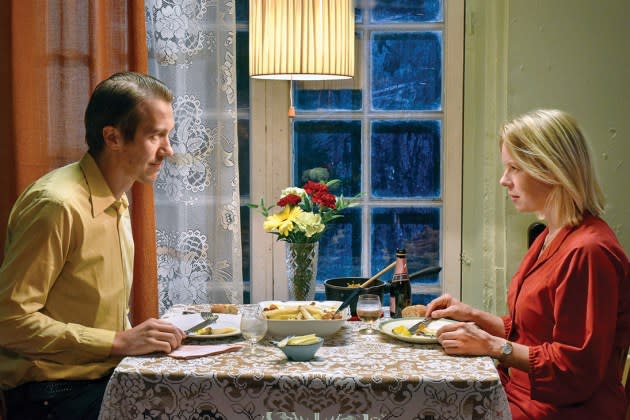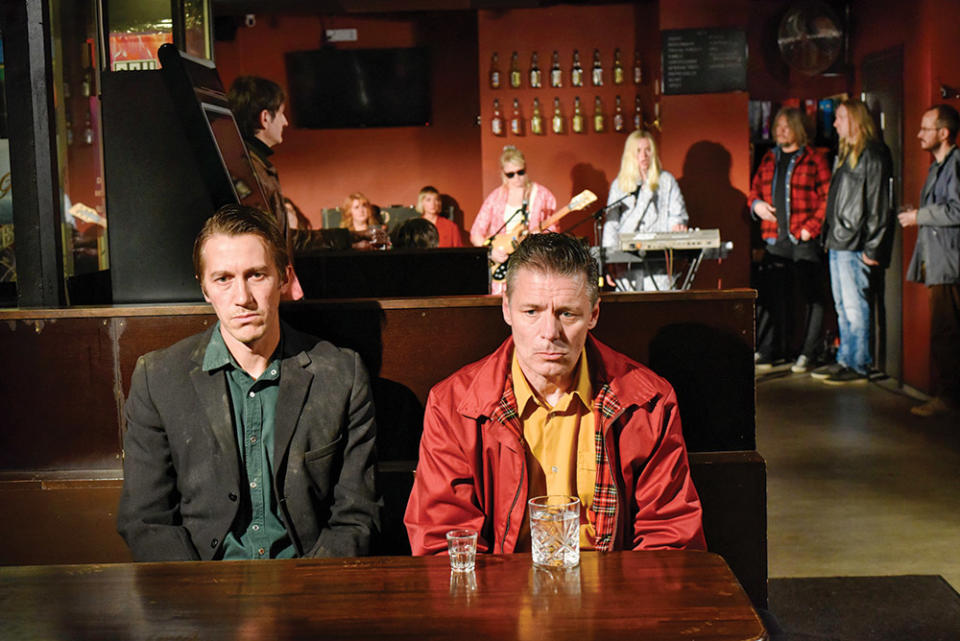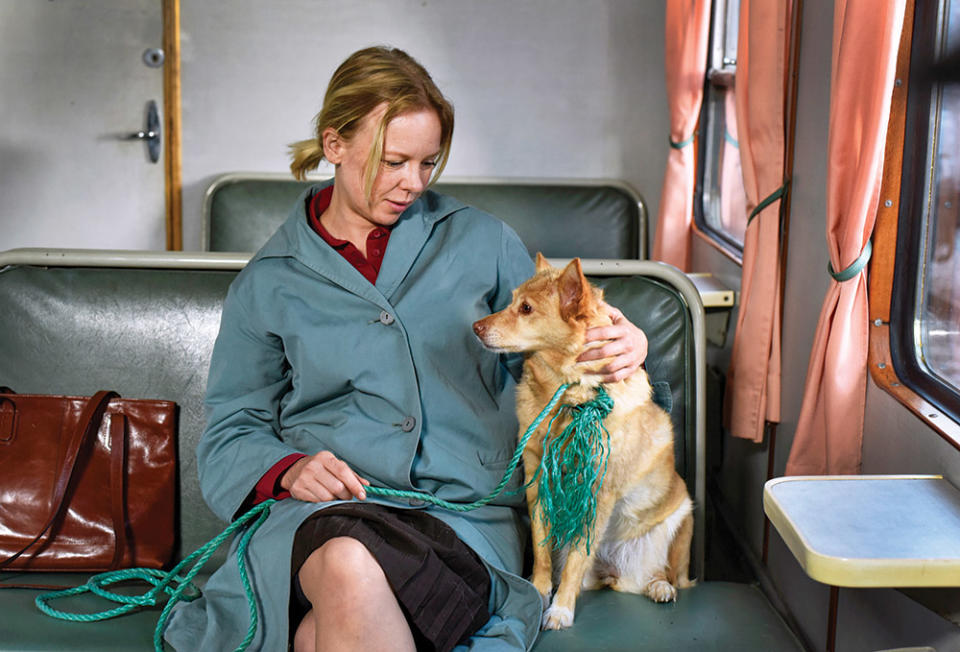‘Fallen Leaves’ Star Alma Pöysti on the Deadpan Rom-Com From Finland: Finns Are “Very Shy, and We Enjoy Our Silence”
- Oops!Something went wrong.Please try again later.

Alma Pöysti agreed to star in Fallen Leaves, Finland’s Oscar entry, before there was a script. It was enough to know that local directing legend Aki Kaurismäki (The Man Without a Past) wanted her for his latest working-class love story, playing Ansa, a shy and lonely supermarket shelf stocker who falls for Holappa, a construction worker, played by Jussi Vatanen.
How were you cast for this film?
More from The Hollywood Reporter
Creative Arts Emmys: 'The Last of Us' Tops Night One Ceremony
'Weird: The Al Yankovic Story' Wins Best TV Movie at Creative Arts Emmys
Creative Arts Emmys: Nick Offerman and Storm Reid Win for Guest Acting in a Drama Series
I got a phone call that Aki wanted to meet for lunch. We met, and Jussi Vatanen, my co-star, was there as well. Aki presented this idea of the movie. There wasn’t a script yet, but he mumbled something about a love story. Then he wanted to talk about the forest and about growing vegetables and politics. All he said about my character was she worked in a store and the two of them would fall in love. We got the script a year later. Aki said he wanted to write a different movie, but this is what came out. When he read it, he said, “Apparently this is the fourth movie in my working-class trilogy.”
What did you think of the script?
It was such a beautiful text. But Aki’s a man of few words. It was the shortest script I’ve ever read. But it was all there. And I realized there was nothing I needed to bring or add or improve. I just needed to learn how to read the script, because everything was so clear, all the clues to the character were there. I had to dare to keep it simple.
How would you describe your character, Ansa?
She’s an independent woman and she takes pride in taking care of herself. There is no one else there to pay the bills, so she doesn’t rely on society and she doesn’t rely on a man. She has these shitty jobs, but they pay the rent, and there’s this solidarity between her and her co-workers and this kind of friendship. One clue was the scene where she gets her electricity bill and she immediately pulls the plugs out of the wall, she immediately takes concrete action.
But she’s also a very lonely woman. And her shyness is definitely a problem for her. It takes a lot of courage for her to break out of that bubble and to allow someone else to mess around with her life a little bit. Then there is that key line, when she talks about her parents: that her father died of alcohol, her brother too, and that her mother died of grief. It’s a big risk for her to fall for this guy who has a drinking problem, because she might end up repeating her parents’ history. So she makes the tough choice and says: “I won’t have a drunk.” She doesn’t become co-dependent, which would be a very common trap. He needs to get his life sorted before he can come back to her. That’s quite radical. And very strong.

What was the shoot like?
Well, there were no rehearsals. Aki told us to please not rehearse, not together and not separately. I’m a real nerd. I love preparing. So this was hard. What I did was I watched all his movies to somehow get into his world. Not to copy what people have done before, but just to realize you are a small link in a long chain that’s already 20 movies long and you can become a partner in a dialogue going on between these movies.
But we showed up on set, we didn’t rehearse, and then we did all the shots in one take. If you missed your lines, we did a second take. It was terrifying, but you realize somehow you only have the one moment and how precious that moment is and how honest you have to be. You have this one chance to react, one chance to get it right. Because as soon as you start to repeat it, you have to start pretending, and there’s a small layer that gets into the work.
And he still shoots on film.
Yes! It was time travel for us digital kids, to have this old-school filmmaking. Everything was shot on 35 millimeter. Everybody’s holding their breath after each take as they check the gate. Aki says he prefers to cut the film before he shoots it. He doesn’t want to waste material, and because it is actual film, the material itself is so precious. Coming from a digital world, where you can have so many takes, so many different angles, it’s such a different way of working.
There are several key scenes when you’re acting with a dog. How does that fit in the one-take method?
Her name’s Alma, the dog, just like mine, which was a wonderful coincidence. She’s a street dog from Portugal, Aki’s own dog. It was her film debut. I’m full of admiration because she’s very disciplined and has a great sense of rhythm. She was making these independent choices that were always spot-on. But I always had a spare sausage for her in my pocket, to get her to recognize it was worth hanging out with me.
What was the most challenging aspect of making this movie?
The humor was one thing. Because there are so many one-liners in the script and they are extremely funny. But you have to say them in a very straightforward, very serious way. Like when Ansa goes to visit Holappa in the hospital and she tells the nurse she’s doesn’t know his last name. The nurse asks if she’s a relative and she says: “Yes, I’m his sister.” Pause. “… in faith.” That was a hard one to keep it together.

Most of my knowledge of Finnish culture and society comes from watching Aki Kaurismäki movies. I often wonder how accurate it is. Especially when people in his films barely speak to each other.
Well, it doesn’t come from nowhere. He creates a fairy-tale Finland, but he perfects this trait of ours. We’re very shy people and we enjoy our silence. We don’t get uncomfortable being silent together. That’s quite normal in Finland, though I guess not in all cultures. And he gets the Finnish humor, which is very dry. He takes it quite far, almost to caricature, but it’s there.
Aki can put on a tough face, but he has the softest heart. He’s a true romantic. If you watch his movies, you can really see that he cares for his characters. There’s such a deep humanity in his movies, the solidarity of people, of these outcasts, who care for each other even if society might not care for them. This caring is a counterforce to the cynicism. This story could have been a very sugary sort of romance, which would have led people maybe to dismiss it. But there’s a lot of salt here to go with the sugar.
This story first appeared in a December standalone issue of The Hollywood Reporter magazine. Click here to subscribe.
Best of The Hollywood Reporter

